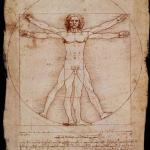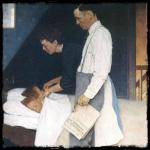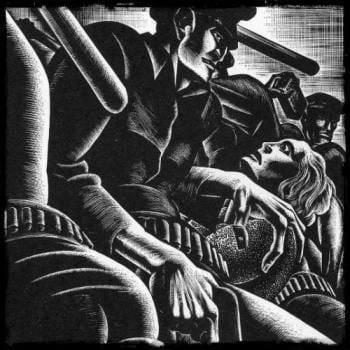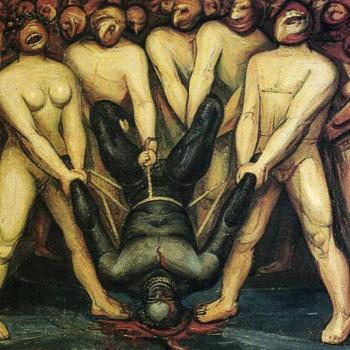“Mine is an odd destiny. Perhaps no man in the United states has sacrificed or done more for the present Constitution than myself — and … I am still trying to prop the frail and worthless fabric. Yet I have the murmurs of its friends no less than the curses of its foes for my rewards. What can I do better than withdraw from the scene? Every day proves to me more and more that this American world was not made for me.” – Alexander Hamilton (1802)
It’s understandable why progressives would imagine Hamilton as their partisan, Big Government comrade. But this understanding of Hamilton is based on a deeply distorted image of him. Call it the “Hamilton Effect”: Twisting history to suit one’s ends, willfully ignoring and ultimately erasing it when it stands in your way. If we knew our history—the true and complete stories of how our nation came to be—we’d know how to fight back against the progressive agenda. And we’d be a lot less likely to accept its overreach. – Senator Mike Lee (2017)
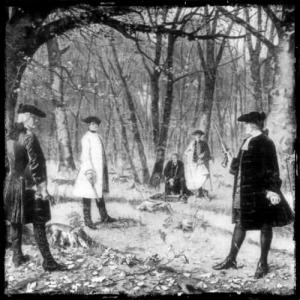 Utah Senator Mike Lee has a historical bone to pick with you. In a widely read article published in Politico Magazine in 2017, called How the “Hamilton Effect” Distorts the Founders, Mike Lee tells us that the Alexander Hamilton you swooned over in Hamilton the Musical was not, in fact, the sexy, passionate, loquacious, hard-working, pro-immigrant, nationalist visionary conjured by Lin-Manuel Miranda from Ron Chernow’s epic biography.
Utah Senator Mike Lee has a historical bone to pick with you. In a widely read article published in Politico Magazine in 2017, called How the “Hamilton Effect” Distorts the Founders, Mike Lee tells us that the Alexander Hamilton you swooned over in Hamilton the Musical was not, in fact, the sexy, passionate, loquacious, hard-working, pro-immigrant, nationalist visionary conjured by Lin-Manuel Miranda from Ron Chernow’s epic biography.
If only we knew our history, Mike Lee writes (and, presumably, if only Ron Chernow knew his history), and weren’t weak suckers for liberal propaganda masking as history, well, then we would realize, truly, that Alexander Hamilton was actually a small government, state’s rights conservative. A principled, free-market, family values conservative perhaps not unlike Mike Lee himself! Ordinarily, one might glissade past such silliness. But Mike Lee is not your garden-variety historian (he’s actually not a historian of any variety). And he might be your next Supreme Court Justice.
As we all know, the intellectual and political legacy of Alexander Hamilton is these days a hot button proxy for a larger (increasingly tense and violent) struggle in the United States about the meaning and practice of democracy. Mike Lee certainly appreciates what is at stake, for the outcome of this existential struggle, in the shape and significance we attach to the national founding, and to its legendary icons such as Hamilton. He believes we all need to know what is at stake.
So let’s get to know Mike Lee and find out why he would want to take time off from the important duties of his day job as U.S. senator to give us a civics lesson about poor Alexander Hamilton, who suffered enough when he was alive more than 200 years ago, and who in death would no doubt prefer to participate in Lin-Manuel Miranda’s glorious shenanigans than Mike Lee’s soul-killing exercise in Constitution-worship.
Who is Mike Lee?
Mike Lee may not be a familiar name to most Americans, but he will be. Like many members of the House Freedom Caucus, Mike Lee was elected to the US Senate in 2010 as part of the Tea Party revolt against the policies and persona of President Obama, and subsequently reelected in 2016. Lee’s father (Rex Lee) served as the government’s influential solicitor general during the Reagan administration and as President of Brigham Young University. His older brother (Thomas Rex Lee) is an associate justice on the Utah Supreme Court. Mike Lee, a devout Mormon, received undergraduate and law degrees from Brigham Young University and worked on two different occasions as a law clerk for Supreme Court Justice Samuel Alito.
Lee endorsed Ted Cruz, whom at the time he called his best friend (and we thought Ted Cruz had no friends) for the Republican presidential nomination in 2016 (while also scorning unbridled hedonist and generally unhinged presidential candidate Donald Trump). In most respects, the two (both geeked-out lawyers) align intellectually, ideologically, and politically.
Lee is one of only a handful of Senators who have consistently received nearly perfect ratings from the Club for Growth, the American Conservative Union, and the Heritage Foundation. His policy positions on tax and budget matters, the environment, public lands, separation of church and state, guns, abortion, education, and the social safety net are reliably off-the-charts conservative. On national security, surveillance, immigration, and some policing, criminal justice, and incarceration matters, Lee trends closer to libertarian positions of Rand Paul.
Why will Mike Lee at some point be a familiar name to most Americans? Because he is young and intelligent and likely immune from personal scandal. His family-friendly Mormon values and high-powered legal background make him (in many ways like Ted Cruz) a safe and compelling conservative option for higher office. Following the resignation of Supreme Court Justice Anthony Kennedy, the names of both Mike Lee and his brother Thomas Rex Lee were floated as potential replacement nominees, and Mike Lee has done nothing to deny his ultimate ambitions extend to a lifetime high court appointment.
Why Does Mike Lee Care About Alexander Hamilton?
Most of Lee’s conservative animus seems to coalesce around his hatred for the federal bureaucracy and contempt for federal bureaucrats, and it this distracting emotional fervor that drives him off the rails when it comes to Alexander Hamilton. Mike Lee cares about Alexander Hamilton because he believes the “progressive left” has willfully misappropriated Hamilton’s nationalist ideas to sanctify their own vision for the “massive, intrusive, unaccountable federal government that today thrives in Washington, DC.” Taking aim at the remarkable cultural and political impact of Lin-Miranda Manuel’s Broadway musical, Lee terms this kind of calculated distortion the Hamilton effect.
Unfortunately, pretty much everything Mike Lee tells us about Alexander Hamilton is spurious and disingenuous. Which is perhaps not surprising given Lee’s political instincts, but nonetheless disappointing given his allegedly exciting bona fides as a constitutional lawyer. While Mike Lee proudly attests to a “nearly lifelong” study of the U.S. Constitution, evidence of these inquiries is sadly lacking in the Hamilton essay. But don’t believe me. Let’s allow Mike Lee to speak for himself.
Mike Lee’s argument (somewhat oddly) does not focus directly on Hamilton’s legal and political ideas, and instead mostly spotlights the limited-government position of Anti-Federalists, who opposed ratification of the Constitution from fears it would “vest too much power in the federal government and thereby imperil liberty.” Lee generally conflates the views of Federalists and Anti-Federalists, as different only by degree, which supports his objections to the modern idea that Federalist supporters of the Constitution were early standard-bearers for “progressive” ideas that justified the consolidation of power within the federal government and the executive bureaucracy, at the expense of state and individual liberty. “Those perpetuating this mischaracterization,” Lee writes, “have done so by erasing the essential truth that underlies a full understanding of the Constitution: the fact that nearly every founder shared a healthy skepticism of a large federal bureaucracy—which they feared might grow to include some of the worst features of the very government they had just fought a revolution to escape.”
This statement is simply incorrect. Lee tells us that “historians and politicians who consider themselves more enlightened than the founders have done special damage to the legacy of the founding generation, a legacy that warned against the dangers of a distant, centralized government.” But modern ideas about and experiences with what Lee calls a “large federal bureaucracy” were obviously unknown to the founders, a point Lee himself makes a few paragraphs later when he writes, “No one living in America in the late 18th century—certainly none of the brilliant minds who forged our founding documents, be they Federalists or Anti-Federalists—could have contemplated just how strong, or how large, the federal government would become.”
When Lee does invoke Hamilton, the vacuity of his analysis and insights is also striking. Lee mentions again what he presumably views as the fatal error of “the left”, which has been to assume that “Comrade” Hamilton could have both envisioned and favored “the sort of massive, intrusive, unaccountable federal government that today thrives in Washington, D.C.” Hamilton, he argues, “scoffed and ridiculed” any concept of government that strayed beyond the “modest, divided, and tightly constrained” outline in the Constitution.
And there Mike Lee basically calls a halt to his scorched earth patristic march on Washington. Subsequent (and quite limited) citations from The Federalist merely argue for Hamilton’s “modest” concept of federal power on the basis of Hamilton’s claims (in Federalist 17 and Federalist 32) that states would retain all rights of sovereignty in their possession prior to ratification and that, in any event, “it will always be far more easy for the State governments to encroach upon the national authorities than for the national government to encroach upon the State authorities.”
Mike Lee then delivers what he seems to believe is the crushing blow to the expansive government hopes of progressives on the left. He states this Hamiltonian opinion about the ease with which state governments could steal power from national authorities “may come as a surprise to those who claim his support to do just the opposite today.”
For the following reasons, this statement from Mike Lee is definitely a where’s the beef moment:
(1) Hamilton here advances an empirical claim, not a normative preference, and so it is not clear how this statement represents his “support” for broad assertions of state sovereignty.
(2) If Hamilton believes the states possess inherently superior “encroaching” capabilities, why all the hand-wringing from conservatives such as Mike Lee about the enfeeblement of the Constitution?
(3) One can emphasize exclusive (and explicit) delegation of powers as a legal and constitutional limit on the sovereignty of the national government, but to infer from such an emphasis that Hamilton shared with other Federalists a “healthy skepticism of a large federal bureaucracy” requires a massive, ahistorical leap in logic.
Indeed, Alexander Hamilton was absolutely an architect of concentrated executive power, which he both theorized and implemented as superior, by necessity and by nature, to the power of Congress and of the state governments.
Alexander Hamilton – Theorist of National Power and the Nation-State
Alexander Hamilton remains the most profound theorist of national power and the nation-state within the American political tradition. Among the founders, no one thought with greater depth and wrote with more eloquence about the presidency. Throughout the course of the nation-building period, Hamilton’s goals remained simple and clear. If the republican Jefferson wished to free each new generation from the world of its fathers, Hamilton sought to create strong and stable political institutions that would confirm for all time the authority of the fathers. As Ron Chernow and Lin-Manuel Miranda have vividly illustrated for us, Hamilton was incredibly ambitious, and he projected on to the nation the great destiny he conceived for himself as a lawgiver.
Hamilton’s vision of politics and the state rested upon psychological and sociological principles. Like Hobbes, he was but half a Puritan. He possessed a profound sense of human depravity, unaccompanied by any corresponding hope for human redemption. Hamilton believed spiritual commitments might be put to advantageous political use, by reinforcing allegiance to state and family. Like John Adams, he greatly feared the political effects of atheism, of a world in which the government itself instructed its people in “the most disconsolate of all creeds, that men are but fireflies and that this all is without a father.” However, he repudiated the republican belief that moral virtue by itself could animate and sustain political institutions (Federalist 6). Neither God nor history promised salvation within an earthly dispensation.
Far from it. Politics was not “inherently redemptive” for Hamilton; it was inherently corrupt. He never doubted that aggressive and violent passions reigned within the human soul. The restless, insatiable ambition and avarice of the people fueled a primitive will to power (Federalist 6). Hamilton therefore recognized (with far more realism than Great Awakening evangelicals or radical natural rights pamphleteers or small-government Anti-Federalists), the fundamental dilemma of politics, that freedom for some has generally depended upon the absence of freedom for others. His pessimistic view of human nature, confirmed by the lessons of history, determined the need in America to separate politics from society and republicanism from democracy.
Strong and stable political institutions, rather than the virtue of the people, could provide the only bulwark against anarchy. The state did not exist to express the general will of the people or, as Madison suggested, to provide a forum within which factions might contend for mastery. Hamilton agreed with Paine that government existed instead to discipline and punish fallen humanity. Unlike Paine, however, Hamilton feared that this unpleasant, yet necessary, duty was in danger of being avoided because of the weakness of the central government under the Articles of Confederation.
Throughout the course of his career in public life, Hamilton’s aim was to obtain enduring political stability through as centralized and authoritarian a government “as republican principles will admit.” However, Hamilton also understood the state to be an active, creative, and autonomous force in its own right. He identified politics, not with widespread citizen participation, but with administration, with laws, and with power wielded through institutions and procedures.
Legal Revolutionary
Hamilton participated in the revolution in American law that occurred late in the 18th and early in the 19th century. If, during the colonial period, the law provided “a paramount expression of the moral sense of the community,” by the 19th century, the legal community proclaimed that the law simply reflected “the existing organization of economic and political power.” During these years, however, it actually became increasingly clear that the law itself could be used to shape and transform society politically and economically. This possibility reinforced Hamilton’s natural inclination to vest significant formal powers within the executive branch of the national government, at the expense of both state governments and of the national legislature.
History confirmed for Hamilton the inevitability of foreign conflict and domestic strife. Because the passions that lead to war or to domestic insurrection flamed within every human breast, the form taken by a government could provide no guarantee of prosperity and happiness within a nation. Hamilton’s point, of course, was that the small commercial republics glorified by Montesquieu were not intrinsically superior to monarchies. They were neither more peaceful nor more just.
In any event, Hamilton believed Americans did not have a choice with respect to the organization of their government. The individual states must relinquish their autonomy, and preferably even their identity. The nation could only survive in a consolidated form. And since, with Montesquieu, he believed that the vastness of the American empire would require an exceptionally vigorous central government to bind it together, Hamilton conveniently discovered a virtue in what he perceived to be the necessity of a strong and authoritative national executive (see Federalist 6, Federalist 9, Federalist 23).
Hamilton’s theory of power and the state did not simply rest upon the need for coercive laws and institutions to defend the nation against external insurrection and domestic factions. He imagined the state itself to be the dynamic source of strength and purpose for the nation. Unlike Americans who continued after the Revolution to subscribe to ancient, commonwealth, or evangelical understandings of republicanism, Hamilton did not identify freedom with the virtue of the people. Nor did he believe that concentrated state power inevitably posed a threat to the freedom of a people. Politics at its best concerned effective administration by a core of educated and responsible elites insulated from electoral politics and social turbulence.
Hamilton mistrusted legislatures, while also scorning the “mad Democrat [who] will have nothing republican which does not accord with his own mad theory — he rejects even representation.” Like John Adams and James Madison, he denied any necessary connection existed between republicanism and democracy. Instead, he identified republican principles with equality under the law and with some degree of commitment to the concept of popular sovereignty.
More even than other Federalists, however, Hamilton believed that creative founding acts and heroic leadership were necessary preconditions for national greatness. Unlike Madison, Hamilton did not understand concentrated power to be a danger equal to that of mob tyranny. He did not appreciate any need to parcelize and disperse power, and one can find in his contributions to The Federalist none of the elegant theorizing about federalism itself so characteristic of Madison’s contributions.
Hamilton simply did not believe that the effects of concentrated power were inevitably corrupting. To the contrary, he repeatedly affirmed that no nation could long survive without the energy — which he understood almost as a life-force — inherent in concentrated power. For this reason, Hamilton greatly admired Napoleon (see his reference to Napoleon while commenting on “the disgusting spectacle” of the French Revolution). Power, he insisted, must be wielded. The energy and authority of the nation’s leaders must be sufficient to provide for the needs of the nation as a whole. Almost by definition, “parchment provisions” for the welfare of the nation could never adequately anticipate the exigencies of national survival. Successful crisis management — Hamilton never doubted that there would be crises aplenty – would ultimately depend solely upon the unconditional trust of the people in their leaders. (Federalist 23, Federalist 25).
Hamilton also believed unfettered leadership alone could provide the vision and the genius necessary to lift the people themselves to greatness. As Treasury Secretary, of course, Hamilton would find himself in a position to bring his own economic and political vision to life. As a result, there is a sense in which his defense of executive power at the Constitutional Convention and in The Federalist provides the anticipatory prolegomenon of his own accession to power (Forrest McDonald emphasizes this point in his Hamilton biography).
Defender of Hereditary Monarchy
Hamilton did indeed work long and hard to gather the states together at the Constitutional Convention and then to obtain the ratification of the Constitution itself. It is also true that he was not present for most of the Convention debate and that he never possessed much faith in the document produced by it.
However, Forrest McDonald has argued that Hamilton’s efforts at the Convention, limited though they largely were to the famous six-hour speech he delivered on June 18, 1787, elevated the philosophical tone of the debate and focused its agenda more directly upon the issue of the relationship between the state governments and the national government. The editors of his papers referred to this speech as “perhaps the most important address ever made by Hamilton” and the unabashed McDonald – whose Hamilton is god-like – claimed that it “contained some of the most profound observations on government ever uttered by an American.”
In this address, Hamilton certainly spoke more openly and honestly than he would in The Federalist about his aspirations for the union. Hamilton specifically emphasized the need for a national government “with decisive powers, in short with complete sovereignty.” The nation could not be rescued from democracy by democratic means. Republican forms of government in general seemed to him to be overly susceptible to corruption and insufficiently vigorous. As Hamilton himself observed, in the aftermath of Shays’ Rebellion even “those most tenacious of republicanism … were as loud as any in declaiming against democracy.” The nation appeared ready to acknowledge the need for a strong, hereditary executive at the national level, within which the “permanent will” of the nation might reside.
The notoriety that attended this speech concerned Hamilton’s praise for the British government against which the new American nation had warred, which he declared to be the best in the world. Only a government modeled on the British constitution, Hamilton said, could effectively unite public strength with private security. Hamilton doubted whether anything short of this arrangement would suffice for America.
More specifically, of course, Hamilton was attempting through his references to the British constitution to lead delegates to the inescapable conclusion that only a hereditary monarchy could stabilize and secure the interests of the nation as a whole. Only a hereditary monarchy could provide enough strength at the national level of government to detach the people from loyalties and commitments to particular states that promised, if unchallenged, to rend the union irreparably. And ultimately, Hamilton believed that only the influence available to a powerful, hereditary monarch, through the capacity to dispense patronage, honors, and emoluments, could harness and direct the popular passions of avarice and ambition toward the support of the national government.
Champion of the National Executive
Hamilton’s reconstruction of the body politic repudiated the corporate sovereignty and the corporate mission of the states. The new government was to be at once more distant from and more closely tied to the individuals subjected to it than the state governments had been. However, the power of the presidency, the energy emanating from it, and its meaning for Americans as the public soul and will of the nation, all required the voluntary subjection and complicit self-alienation of the nation reduced, not to its states, but to its individuals. This subjection would guarantee the permanence of the government and infuse it with vitality.
In The Federalist, Hamilton’s essays on the presidency differ dramatically in tone and substance from his address to the Convention. For tactical reasons, Hamilton did not argue with nearly as much force for a strong national executive. And because his efforts largely consisted of attempts to impugn the motives and deny the validity of Anti-Federalist criticisms of Article II of the Constitution, the essays tend generally to stress differences between the presidency and European monarchies.
Having already addressed the subordination of state governments to the national government, Hamilton focused in these essays upon the need for executive independence from the national legislature. He did not address in detail the relationship between the presidency and the people, perhaps because the indirect election of the president tended to mask its importance. No part of the proposed Constitution, Hamilton asserted, had been “inveighed against with less candor, or criticized with less judgment” than the executive. Its opponents played upon the popular aversion to monarchy by representing the president “not merely as the embryo but as the full-grown progeny of that detested parent.” (Federalist 67)
In fact, Hamilton argued, the presidency more closely resembled the office of the Governor of New York than it did the British monarchy. The presidency lacked an absolute veto, performed no ceremonial role, could not dispense honors, and contained no particle of spiritual jurisdiction. Hamilton also assured his readers that the election of the president every four years by people chosen from the nation at large, and his liability to impeachment, trial, and dismissal from office for high crimes and misdemeanors would adequately secure the nation from the depredations of an autonomous and irresponsible power. In “the republican sense” of the term, the executive was “safe” (Federalist 77).
The barely hidden premise behind Hamilton’s defense of the executive in The Federalist was that the national legislature, and the people themselves, posed far greater threats to the freedom and the security of the nation than did a vigorous and active executive. Because he considered both the legislature and the community at large to be ignorant and unreliable, he wished, at all costs, to avoid the “servile pliancy” of the executive upon either (Federalist 75, Federalist 77).
For Hamilton, the independent will of the executive constituted its very soul. While the indirect method of election promised to distance the presidency from popular “tumult and disorder,” he remained exceedingly wary of legislative bodies that directly represented the people (Federalist 68). Hamilton demonized legislatures because they inevitably attempted to “annihilate” the executive will. Specific presidential powers such as the veto he regarded almost literally as instruments of war. These the president would deploy, not so much to protect the nation from bad laws, as to “shield” the executive itself from the “depredations” of an “imperious” national legislature inflamed by the passions of the people (Federalist 71, Federalist 73, Federalist 74).
Power, Art and Creation
These concerns notwithstanding, Hamilton’s proposed reconstitution of public power did, in fact, amount to a resurrection of royal authority. Token references to accountability, popular sovereignty, and the republican spirit of executive authority could not disguise the fact that Hamilton’s president existed to provide both stability and leadership.
Unlike theorists of federalism such as Madison, Hamilton did not really understand the Constitution to be a mechanical device that would limit the concentration of power and thereby preserve the freedom of the people. To the contrary, he believed both the supremacy and the necessary and proper clauses of the Constitution bestowed virtually unconditional grants of power upon the national government. And almost by definition, these powers devolved onto the branch of government responsible for their execution (see Hamilton’s report to Washington on the constitutionality of a national bank).
However, if good government consisted in the proper execution and steady administration of the laws, Hamilton did not simply conceive of the power of the presidency in these instrumental and technical terms (Federalist 68). The president would also perform a variety of other functions, all of which revealed the creative and artistic forms that power might take when shaped by a master spirit (kindred, one presumes, to Hamilton’s).
The president would infuse the body politic with “vigor” and energy (Federalist 70). He would educate and discipline the nation’s citizens, thereby elevating them to a higher plane of political and moral awareness (Federalist 71). He would direct “the common strength” against foreign invaders and domestic insurgents (Federalist 73, Federalist 75). Finally, through his power to pardon all offenses short of treason, the president would provide absolution for his people. His would indeed be a saving grace (Federalist 74).
For these reasons, Hamilton did not wish to limit the horizons of those great leaders with vision by restricting their term in office. Those with the passion for power and preeminence would not be denied in any event. If stifled, their passion might assume a far more dangerous form (Federalist 72).
Do Not “Remain Long at Table”
During and after the Revolution, it has been suggested, most Americans never fully relinquished their desire to be ruled by a just and wise king, one who would secure the nation from the twin dangers of foreign aggression and domestic faction. Hamilton himself did not doubt the stability and security of the nation depended upon both the institutional and personal unassailability of presidential authority. Using the British monarchy as his model, he therefore counseled President Washington to maintain his distance from other important political figures and to limit direct interaction with members of the House of Representatives and with ordinary citizens.
Presidential etiquette dictated that Washington accept no invitations and return no visits. When entertaining others, he must never “remain long at table.” In dispensing this advice to the great man, Hamilton recognized the need for the President always to control the terms of his engagement and discourse with others. Like Job’s God, Washington must reveal to no one his human face. This would preserve the respect and awe of others for his office and his person, and thereby establish the essential conditions for stable rule.
However, ceremony, ritual, distance, and dignity all served another purpose as well. They infused the presidency with the mystical meaning of the nation itself. The widespread understanding of the President Washington as a “patriot-king,” as the new agent of national redemption, liberated Hamilton — who played Prime Minister Walpole to Washington’s King George II — to pursue his own policy agenda.
The Political Economy and the Masterless Man
Forrest McDonald emphasized Hamilton’s “detestation of dependency and servility,” his desire to be masterless. However, Hamilton did not seek to break ties of dependence, so much as he aimed to transfer them, from the provincial planter oligarchies that ruled at the state level to the national government and the presidency.
Hamilton never abandoned his commitment to securing the allegiance of the American people to inherited forms of authority. While he could not expect to gain acceptance for hereditary personal authority, he worked diligently as Treasury Secretary to establish institutions, procedures, and behavioral norms that would bind citizens, and influence their behavior across the generations to come. He endeavored to establish a system (or regime) into which citizens would be born, the assumptions and practices of which would be as familiar and natural, and as necessary to their sense of well-being, as the air they breathed. In this manner, he hoped to narrow their political horizons, by limiting their ability to conceive a broad array of political alternatives, and to channel their turbulent energies into productive economic activity that would enhance the prestige and power of the state.
Hamilton imagined the most important task of the new government, after its vigorous provision for the external and internal security of the nation, to be the promotion among its citizens of something like the worldly asceticism described by Max Weber. He premised his vision upon the need to harness and set to work the naturally avaricious and covetous inclinations of the people. Hamilton believed that Americans “labour less now than any civilized nation of Europe,” and all of his major policy initiatives – the funding of the debt, the creation of the National Bank, and the promotion of manufacturing – aimed, ultimately, to eradicate the slothfulness of the idle and the burdensome (see Hamilton’s 1781 letter to Robert Morris).
The pre-capitalist moral economy, upon which the pastoral vision of the Jeffersonians rested, must give way to a market economy. All must be drawn into the market. The market itself must not be impeded by internal barriers to commercial and financial intercourse. The monetization of society would provide the means to accomplish both ends. Like Hobbes, Hamilton understood money to be “the vital principle of the body politic … that which sustains its life and motion and enables it to perform its most essential functions.” (Federalist 30) Through measures that ranged from the assumption of the debt to the introduction of coins of small value, he hoped to induce people to work for less and to familiarize the entire nation with the principles of trade, commerce, and finance.
Supported and encouraged by strong government institutions such as the National Bank, the executive, and the courts, Hamilton was confident the population would grow accustomed to the market allocation of values and judgments. The political and moral implications of Hamilton’s economic policies derived from his understanding of all the founders (but especially of himself) as artists and creators, as well as from the harsh judgments that he rendered upon humans and upon history.
Making History and Making Life
Unlike the evangelicals and the Jeffersonians, Hamilton denied the presence of any innate moral sensibility or divine spark within the human heart. However, his understanding of the “interested” inclinations of the people depended upon the retreat of the godhead, and upon the restless desire and emotional isolation of the self characteristic of a Hobbesian state of nature. Hamilton did not believe the founding act lifted citizens from this primeval condition. Instead, by separating cleanly the state from its social foundations, this founding alienated politics from labor and therefore from the body, separating the task of making history from that of making life.
By alienating from the natural bodies of citizens their souls to provide the nation with a “public soul”, the Constitution reduced citizens to preoccupations of the body, to an elemental economic competition upon the success of which, they were assured, their survival depended. In the 19th century, the apotheosis of the nation’s founding fathers trapped its children in this distance separating Creator from Created.
The Hamiltonian vision promised economic mastery over body and nature, at the price of imprisonment within the walls of the created body politic, within the world of the founding fathers. Alexander Hamilton ultimately found himself shackled to the walls of this prison. As his letter to Gouvernour Morris at the beginning of this essay indicates, Hamilton, reeling from the death of his son in a duel, came to doubt the value of the Constitution, this “frail and worthless fabric.” He came to wonder, that “this American world,” for which no one had “sacrificed or done more” to birth, “was not made for me.”

